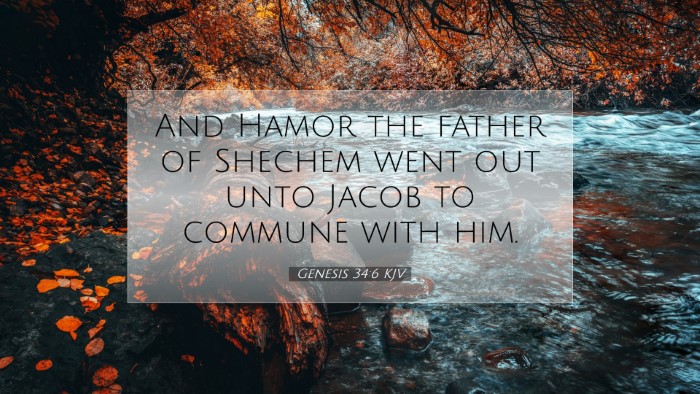Commentary on Genesis 34:6
Verse Context: Genesis 34:6 states, “And Shechem the son of Hamor the Hivite, prince of the country, saw her; and he took her, and lay with her, and defiled her.” This event initiates a series of tragic developments in the narrative of Jacob and his family.
Introduction
This account serves as a crucial turning point in the story of Jacob’s family and highlights themes of honor, vulnerability, and the complexities of human relationships. The commentaries by esteemed theologians shed light on the moral implications, social dynamics, and theological insights contained within this verse.
Insights from Public Domain Commentaries
Matthew Henry's Commentary
Character Study of Shechem: Matthew Henry emphasizes the character of Shechem, describing him as a man of authority and power who acted upon his desires without regard for Dinah’s agency or the consequences of his actions. He notes the dangers of unchecked passion and how it leads to the defilement of Dinah.
Henry reflects on the term “defiled,” indicating not only a physical act but also a serious moral failing. He points out that this act cannot be excused or diminished by Shechem's social status.
Albert Barnes' Commentary
Cultural Implications: Albert Barnes provides an analysis of the cultural context of the action. In ancient Near Eastern societies, the act of taking a woman was often linked to issues of honor and shame. Barnes explains that Shechem's actions had deeply dishonored Dinah's family, especially given Jacob's status and the promises made by God to protect his lineage.
He also discusses the ramifications of such acts on familial alliances and the significance of Dinah’s status as Jacob’s daughter, emphasizing that this event would strain the relations between the Israelites and the Hivite people.
Adam Clarke's Commentary
Moral Failure: Adam Clarke articulates the profound consequences of Shechem's immoral behavior. He notes that such violation was not merely a personal crime but one that carried communal repercussions. Clarke highlights the moral fabric of the family and society that is torn as a result of Shechem's actions.
Furthermore, Clarke emphasizes the importance of Dinah's personal identity and potential voicelessness in this encounter, raising ethical questions about agency, consent, and the responsibilities of both individuals and communities to protect their members from harm.
Theological Reflections
The account of Dinah’s defilement is not simply an isolated event; it is woven into the broader narrative of God’s covenant with Jacob and his descendants. This tragedy serves as a reminder of the fallen state of humanity, the pervasive issues of sin, and the need for redemption.
Implications for Ministry: Pastors and theologians can draw upon this text to discuss various aspects of human relationships, the dangers of power, and the necessity of protecting the vulnerable. The commentary also opens avenues for discussing the grace of God in the midst of humanity's failures.
Practical Applications
- Addressing Sexual Ethics: Churches may use this passage to tackle contemporary issues surrounding sexual ethics, consent, and accountability.
- Strengthening Family Bonds: The narrative illustrates the importance of upholding family honor and the role of families in safeguarding their members, encouraging pastoral care within families.
- Engaging with Cultural Contexts: Emphasizing the cultural implications of biblical texts can aid believers in understanding scriptural teachings in relation to modern societal contexts.
- Promoting Discussion on Justice: This incident underlines the need for justice within communities and the church's role in advocating for those who have been wronged.
Conclusion
The narrative of Genesis 34:6, while grim, serves as a rich source of reflection for theologians and church leaders. By examining the text through the lenses of historical context, moral implications, and theological insights, one can gain a more profound understanding of God’s workings amid human brokenness.
As we ponder the lessons from Dinah’s story, may we be reminded of the importance of righteousness, the value of each individual, and the call to protect the vulnerable within our communities.


